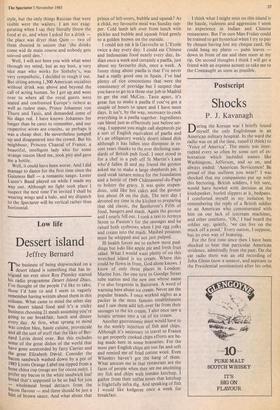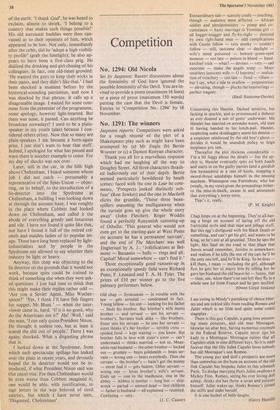Postscript
Shocks
P. J. Kavanagh
During the Korean war I briefly found myself the only Englishman in an American military hospital. In the ward the radio was on all the time, tuned (I think) to `Voice of America'. The music was inter- rupted every so often by some sort of ex- hortation which included names like Washington, Jefferson, and so on, and always ended: 'American Servicemen! Be proud of that uniform you wear!' I was shocked that my companions put up with this hectoring. British soldiers, I felt sure, would have howled with derision at the loudspeaker, hurled slippers at it, bedpans. I comforted myself in my isolation by remembering the reply of a British soldier to an American who commiserated with him on our lack of icecream machines, and other comforts. `Oh,' I had heard the soldier say, quietly, 'we can live on the muck off a pond.' Every nation, I suppose, has its own way of boasting.
For the first time since then I have been shocked to hear that particular American stridence, admittedly from the past. On the car radio there was an old recording of John Glenn (now a senator, and aspirant to ( he Presidential nomination) after his orbit
of the earth. 'I thank God', he was heard to exclaim, almost to shriek, 'I belong to a
country that makes such things possible!'
His old astronaut buddies were then can- vassed as to their opinions, of him, which
appeared to be low. Not only, immediately after the orbit, did he 'adopt a high visibili- ty profile' (grab the limelight), he also ap- pears to have been a first-class prig. He disliked the drinking and girl-chasing of his colleagues. In fact, one old-timer growled: `He wanted the guys to keep their wicks in their pants, and they didn't like that.' I had been shocked a moment before by the hysterical-sounding patriotism, and now I was shocked by that phrase. It calls up a disagreeable image. I waited for some com- ment from the presenter of the programme, some apology, however light-hearted. But there was none, it passed. Can anything be broadcast nowadays? I used to be a plain- speaker in my youth (alas) because I con- sidered others prissy. Now that so many are plain-speakers I am become a born-again priss. I just don't want to hear that stuff. Indeed, I apologise for what has passed and warn there is another example to come. For my day of shocks was not over.
Later, still in the car, in the hills high above Cheltenham, I heard someone whose job I did not catch — presumably a representative of the Spies Union — objec- ting, on its behalf, to the introduction of a lie-detector into the Spydrome at Cheltenham, a building I was looking down at through the autumn haze. I was roughly in the place where Cobbett had looked down on Cheltenham, and called it the abode of everything greedy and luxurious and vile. I have not found it quite like that, nor have I found it full of the retired col- onels and maiden ladies of its popular im- age. These have long been replaced by light- industrialists and by people in the Spydrome not allowed to say whether their industry be light or heavy.
Anyway, this chap was objecting to the lie detector on the grounds that it would not work, because spies could be trained to think of something else when they were ask- ed questions. I just had time to think that this might make their replies rather odd - 'Are you a Soviet Agent, Miss Wother- spoon?"Yes, I think I'll have fish fingers
for supper, Mr Blunt.' — when the inter- viewer came in, hard. `If it is no good, why do the Americans use it?' Ha! 'Well,' said the man, 'I can only quote President Nixon. He thought it useless too, but at least it scared the shit out of people.' There I was again; shocked. What a disgusting phrase that is.
I looked down at the Spydrome, from which such spectacular spillage has leaked over the plain in recent years, and devoutly hoped the lie detector would not be in- troduced, if what President Nixon said was (for once) true. For then Cheltenham would be even worse than Cobbett imagined it; one would be able, with justification, to sign letters in the way beloved of tired satirists, but which I have never seen, 'Disgusted, Cheltenham'.















































 Previous page
Previous page